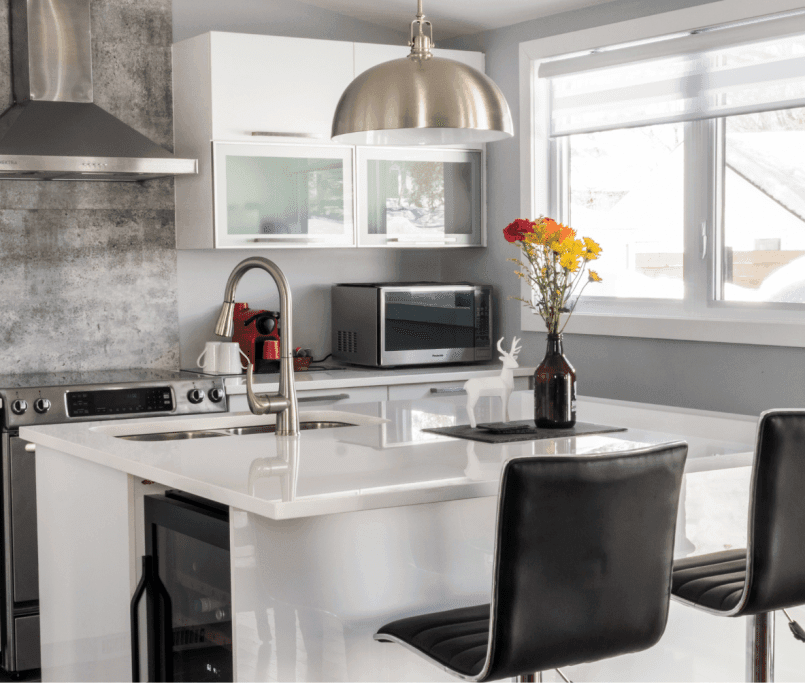Granite vs Quartz – Which is better?
One of the most crucial things to consider when designing renovations for your new BTO or HDB flat is your kitchen countertop.
It is essential that you choose a material that is tough enough to withstand the daily cutting, chopping, and cooking work.
The kitchen countertop is typically large in size; hence, it constitutes a large part of the color scheme. More importantly, the countertop will determine the overall feel of the kitchen.
There are two countertops which are immensely popular choices for homeowners – quartz and granite. Made out of stone, one might probably wonder about the advantages and disadvantages of these two materials.
What makes up the different colors of granite? What makes a granite light or dark, and what causes cracks within the stone? Is it true that quartz is more durable than granite?
This article will attempt to outline the physical attributes and the durability of granite and quartz.
Image via: Stone Amperor
How is Granite Formed and What Is It?
Granite is an igneous rock that is made up primarily of quartz and a mixture of additional trace minerals. Meaning, it was formed during the cooling of molten rock and are buried below kilometers of rock and sediment.
These minerals and their variation gave granite the numerous colors and textures in granite countertops. Granite is not uniform in color or appearance. Certain homeowners might find this appealing while others might consider this as a drawback.
Due to seasonal variations in temperatures, some granites could be weakened during its formations. Granite is mined in quarries, and after extraction from the earth, they are polished and sanded and used as tiles and other building materials.
Granites are not indestructible, but they are incredibly durable. They can break or chip if abused, but if they are properly maintained, they will last a lifetime.
Image via: Stone Amperor
In granite, there are no two pieces that look the same. The most notable aesthetic of granite is its grain as there is a range of varying composition that causes this appeal. If you have an L-shaped island and opt for granite, you will notice seams where the separate pieces or slabs are joined together.
It is almost impossible to hide the seams in a granite countertop completely, but a good fabricator will make them very hard to spot. Do note that the samples you are given when you visit a store, can slightly differ from the actual stone you will receive.
Image via: Stone Amperor
How is Quartz Formed and What Is It?
Quartz is a mineral that is found in metamorphic and igneous rocks and consists of silica. Quartz countertops are manufactured by combining crushed quartz with polymer resin and colored pigments.
A quartz countertop is composed of quartz arenite; a rock made up of at least 90% quartz. The rest of the countertop is composed of polymers, resins, and various types of pigments. The pigment is used to provide coloration that is naturally found in quartz arenite.
The mixture is placed in a vacuum under enormous pressure, producing dense and non-porous slabs which are then polished for household use.
This composition creates a very durable artificial rock without cracks or pores. If you are confused that there are granite countertops and quartz countertops, remember that granite is a type of foundation that is partially composed of quartz, a mineral.
Image via: Stone Amperor
Which One Should You Choose?
A quick search on the internet will give a range of different opinions about quartz and granite, and there is a noticeable common theme amongst the reviews. One homeowner will tell you to buy a quartz countertop while another will insist you purchase a granite counter.
This is a debate which ultimately you must ask yourself. Price is the utmost important consideration between the two. However, other than the price difference, there are two other variables to take into account.
One variable is whether you prefer a manmade stone or a natural stone. You will find much more beauty in granite, and there is an unspoken excitement involved in picking out the small imperfections and color variations.
In this case, granite possesses a unique feel that never disappoints in upgrading or constructing a kitchen countertop. Akin to marble, granite is decked with swirls and specks, making it the preferred choice for those who desire a more natural look.
Image via: Stone Amperor
The second variable is the ease of use in several different factors. Quartz countertops are primarily made of quartz, which means they are more durable than granite. Quartz countertops are sealed and therefore not porous.
Homeowners with quartz countertops will find that it is more comfortable to maintain and clean – a factor that is crucial for most homeowners. If the primary concern is to have a countertop that can be heavily used and easily maintained, then quartz countertop is the apt choice.
Quartz can be easily dyed to a specific color to match with a house existing aesthetics. On the other hand, it is more difficult to dye granite.
Image via: Stone Amperor
Final Word
Both quartz and granite countertops owners will have their reasons for choosing a material over the other. Picture this, you are looking at a painting, and you absolutely love it. Then someone else comes along and tells you how bad the painting is. But because you still love the painting, you will not be moved by the bad critique. Ditto – The same goes for quartz and granite!
At the end of the day, choosing either will provide you with a countertop that you will love.
In conclusion, you cannot go wrong with either quartz countertop or granite countertop. Perhaps, the most crucial factor when choosing a countertop is to have fun choosing your very own slab and making it an essential process for you and your family.
Image via: Stone Amperor




